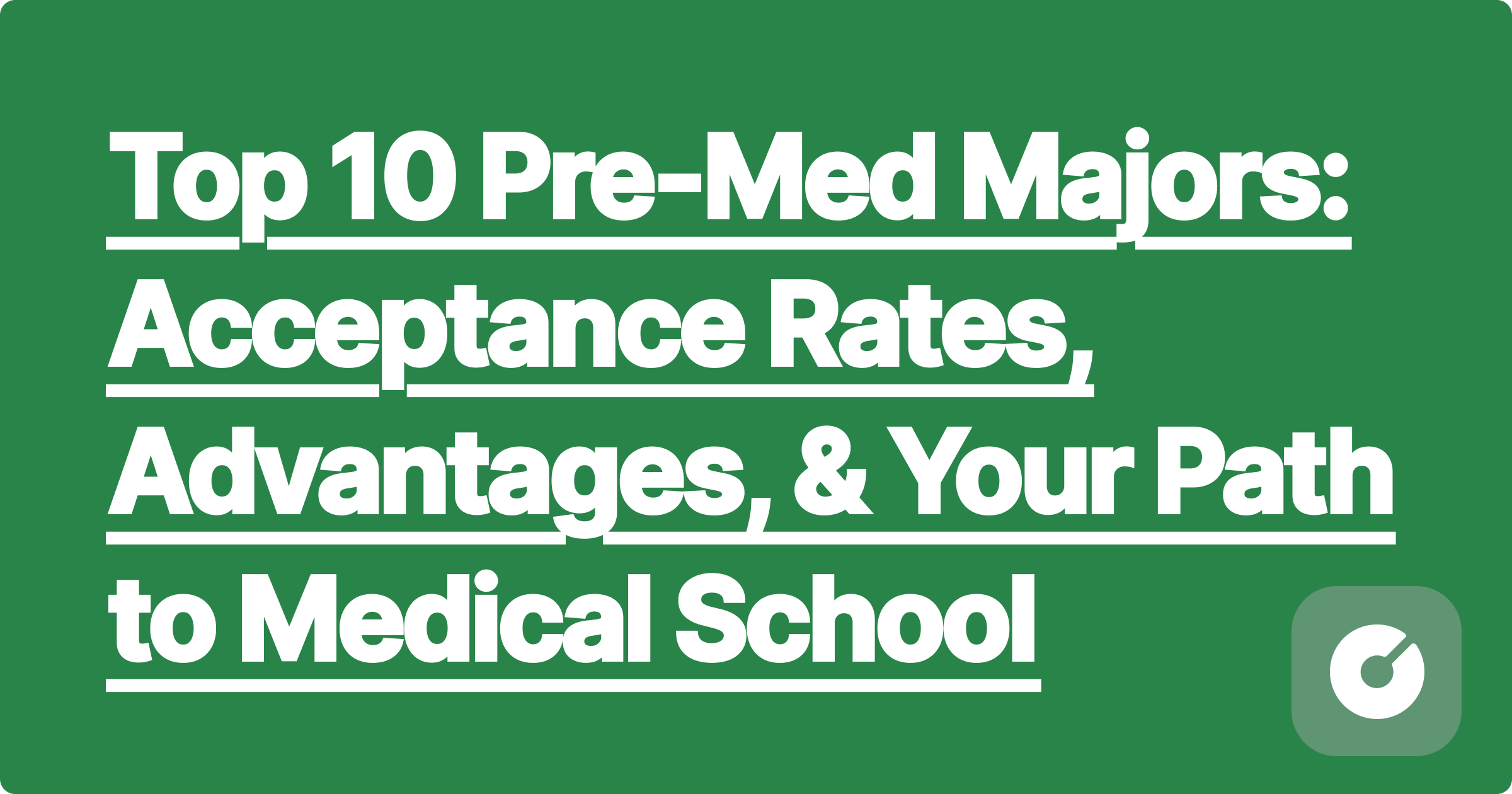
The journey to becoming a doctor is rigorous, demanding years of dedicated study and unwavering commitment. Choosing the right pre-med major is a crucial first step, significantly impacting your academic trajectory and chances of medical school acceptance. This comprehensive guide explores the top 10 pre-med majors for 2024, providing insights into acceptance rates, advantages, cost considerations, and actionable advice to help you navigate this challenging but rewarding path. Note that precise 2024 data for all universities is not yet fully compiled; this post uses the most current available data and will be updated as 2024 data becomes available.
Before delving into specific majors, it's vital to understand that medical school admissions are holistic. While your major plays a role, it's just one piece of the puzzle. Medical schools heavily weigh:
GPA: A strong GPA consistently above 3.7 is generally expected for competitive applicants.
MCAT Score: A high MCAT score is paramount, typically above 510.
Research Experience: Significant involvement in research, ideally resulting in publications or presentations, strengthens your application.
Clinical Experience: Shadowing physicians, volunteering in hospitals, or working as an EMT demonstrates your commitment to medicine.
Extracurricular Activities: Demonstrating leadership, teamwork, and commitment through extracurriculars adds depth to your profile.
Letters of Recommendation: Strong letters from professors and mentors who can vouch for your abilities are essential.
Personal Statement: A compelling personal statement showcasing your passion for medicine, experiences, and reflections is crucial.
This list isn't ranked in order of preference, as the best major depends on your individual strengths and interests.
1. Biology:
Advantages: Provides a strong foundation in biological sciences, directly relevant to medical school curriculum. Widely offered, making course selection flexible.
Acceptance Rate (Illustrative Example – University of California, Berkeley): Highly variable depending on the university. Berkeley's overall acceptance rate is around 15%, but pre-med acceptance to medical school is considerably lower.
Average GPA/MCAT (Illustrative Example): Highly competitive applicants to medical schools from Berkeley often have GPAs above 3.8 and MCAT scores above 515.
Cost: Tuition varies greatly by institution; expect to pay anywhere from $10,000 to $60,000+ annually, depending on whether you attend a public or private university, in-state or out-of-state.
2. Biochemistry:
Advantages: Focuses on the chemical processes within living organisms, providing a deeper understanding of disease mechanisms.
Acceptance Rate (Illustrative): Similar to Biology, highly competitive.
Average GPA/MCAT (Illustrative): Expect similar competitiveness to Biology majors.
Cost: Similar cost range to Biology.
3. Chemistry:
Advantages: Strong foundation in chemical principles, essential for understanding pharmacology and other medical fields.
Acceptance Rate (Illustrative): Similar to Biology and Biochemistry.
Average GPA/MCAT (Illustrative): Similar competitiveness.
Cost: Similar cost range.
4. Neuroscience:
Advantages: Specialized focus on the nervous system, ideal for students interested in neurology, psychiatry, or neurosurgery.
Acceptance Rate (Illustrative): Highly competitive.
Average GPA/MCAT (Illustrative): High GPA and MCAT scores are expected.
Cost: Similar cost range.
5. Human Biology:
Advantages: Integrates biological, social, and cultural perspectives on human health.
Acceptance Rate (Illustrative): Highly competitive.
Average GPA/MCAT (Illustrative): High GPA and MCAT scores are expected.
Cost: Similar cost range.
6. Psychology:
Advantages: Provides insight into human behavior and mental health, valuable for psychiatry and other related fields.
Acceptance Rate (Illustrative): Highly competitive, but perhaps slightly less so than the pure science majors.
Average GPA/MCAT (Illustrative): Strong GPA and MCAT scores are still crucial.
Cost: Similar cost range.
7. Biomedical Engineering:
Advantages: Combines engineering and biological principles, leading to innovative solutions in healthcare.
Acceptance Rate (Illustrative): Highly competitive.
Average GPA/MCAT (Illustrative): Expect high GPA and MCAT scores.
Cost: Similar cost range.
8. Public Health:
Advantages: Broader perspective on health issues, valuable for understanding population health and preventative medicine.
Acceptance Rate (Illustrative): Competitive, but potentially slightly less so than other science majors.
Average GPA/MCAT (Illustrative): Strong academics are still essential.
Cost: Similar cost range.
9. Cell Biology:
Advantages: Focus on the structure and function of cells, relevant to many areas of medicine.
Acceptance Rate (Illustrative): Highly competitive.
Average GPA/MCAT (Illustrative): High GPA and MCAT scores are expected.
Cost: Similar cost range.
10. Molecular Biology:
Advantages: Focuses on the molecular basis of biological activity, crucial for understanding disease processes at a fundamental level.
Acceptance Rate (Illustrative): Highly competitive.
Average GPA/MCAT (Illustrative): High GPA and MCAT scores are expected.
Cost: Similar cost range.
Strong Academic Foundation: Maintain a high GPA from the start.
MCAT Preparation: Start preparing early for the MCAT. Consider enrolling in a prep course.
Research Experience: Seek research opportunities in your chosen field.
Clinical Experience: Gain clinical experience through volunteering, shadowing, or paid positions.
Extracurricular Involvement: Engage in activities that demonstrate leadership and teamwork.
Networking: Attend medical school fairs and connect with current medical students and physicians.
Mentorship: Seek guidance from professors, advisors, and mentors.
* Personal Statement: Craft a compelling personal statement that highlights your unique experiences and motivations.
Choosing a pre-med major is a significant decision, but remember that your academic performance, extracurricular activities, and clinical experience are equally critical. By focusing on strong academics, gaining relevant experience, and building a well-rounded profile, you can significantly increase your chances of acceptance into medical school. Remember to research specific medical schools, understand their requirements, and tailor your application to their unique criteria. The journey is challenging, but with dedication and strategic planning, your dream of becoming a physician is achievable.
Second Career Medical Students: Changing Paths to a Rewarding Career
Foreign Medical Schools for US Students: A Comprehensive Guide for 2024 and Beyond
Osteopathic Medicine: Growing Acceptance and Benefits for Aspiring Physicians
Joint Degree Programs: MD/MBA, MD/JD, MD/MPH – Your Path to a Multifaceted Career in Medicine
Medical School Specialties - Choosing Your Path Early: A Guide for Pre-Med Students
Cornell Pre-Med Requirements and MCAT Preparation Resources: Your Path to Medical School
Yale Pre-Med Requirements and Medical School Acceptance Rates: Your Comprehensive Guide to Success
Medical School Study Strategies That Top Students Use: Ace Your Exams and Thrive
Stanford Medical Youth Science Program (SMYSP): Your Pre-Med Path to Success
Non-Traditional Medical School Applicants Guide: Your Path to a Doctorate